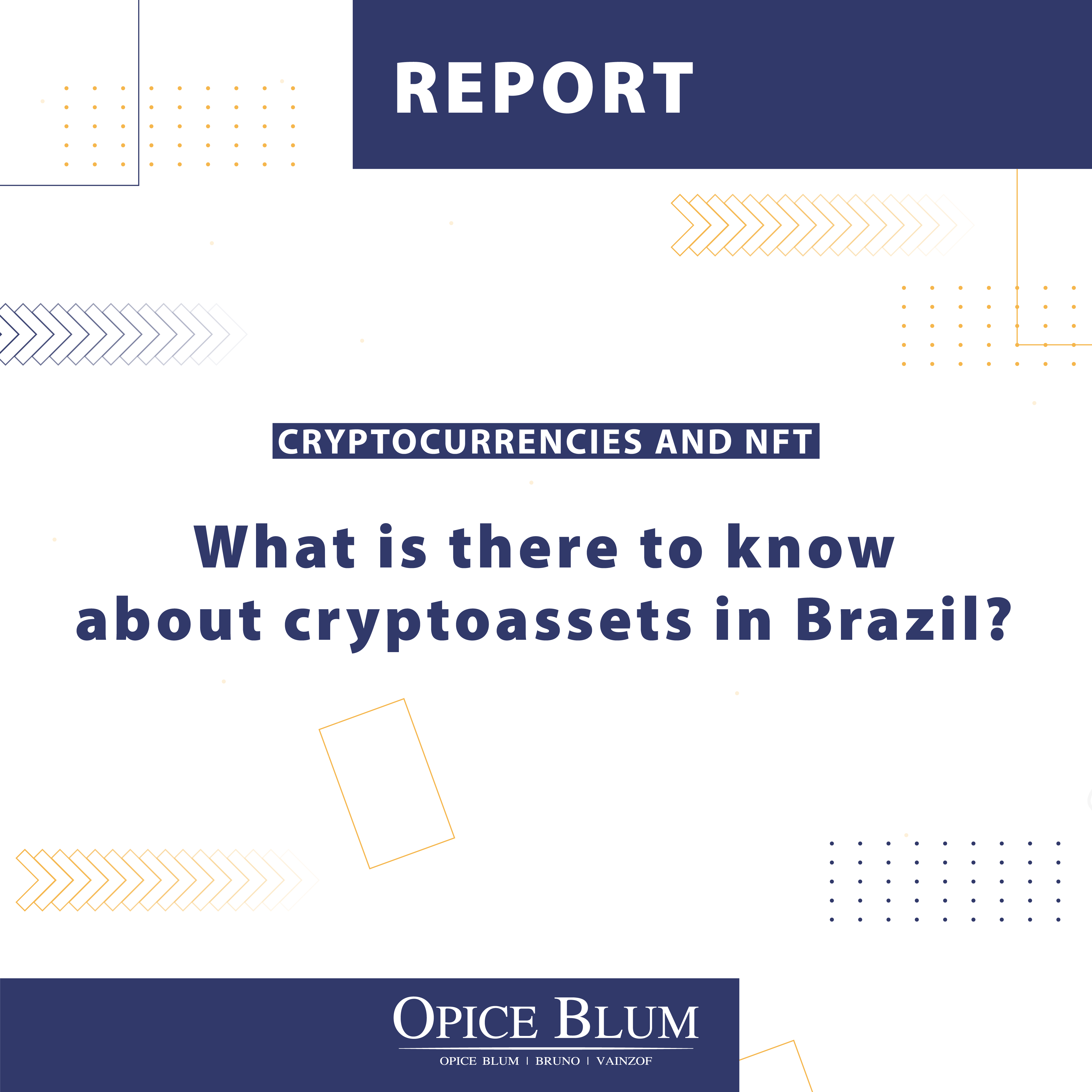For years now, cryptoassets have been a hot topic. Cryptocurrencies and, more recently, non-fungible tokens have taken over the regulatory agenda in several countries, including Brazil. Today, although the buying and selling of cryptoassets is a legal operation, they are not subject to any specific regulation, since they are not understood, in principle, either as currency, which is a responsibility of the Central Bank of Brazil, or as a stock, which is regulated by the Securities and Exchange Commission (CVM).
The expectations, however, are that this scenario will change soon. According to the Central Bank, cryptoasset imports added up to US$ 6 billion last year, almost twice as much as in 2020 (US$ 3.3 billion) – an amount that itself indicates the need for greater regulation. Bills to regulate the cryptoasset market have been debated in the National Congress, aiming to bring legal certainty to the organizations that operate in the market as well as to investors. Other interesting initiatives, such as the creation of the first Brazilian CBDC and a regulatory sandbox, which we will briefly address in this newsletter, have also taken place.
A brief history of cryptoassets in Brazil
In Brazil, the first relevant statement on the subject came from the Central Bank, in 2014, through Communication No. 25.306 of February 19, 2014, in which the institution indicated the risks involved in the acquisition of and transactions with virtual currencies. In this Communication, the Central Bank made it clear that cryptocurrencies are denominated in a unit of account distinct from currencies issued by sovereign governments, and do not characterize an electronic device or system for storage in reais – that is, these currencies should not be confused with “electronic currencies”, regulated by Law No. 12.865 of 2013.
In November 2017, the Central Bank issued Public Statement No. 31.379, which pointed out the lack of laws regarding operations carried out with virtual currencies and reiterated the risks related to these operations, as they are not properly regulated and/or supervised. Also, in August 2019, the Central Bank officially recognized cryptoassets as “produced non-financial assets” and cryptoasset mining as a “productive process”. From then on, these operations became part of the Brazilian trade balance, i.e., national statistics of exports and imports of goods begin to include purchases and sales of cryptoassets.
The Brazilian IRS also expressed its opinion on the topic, explaining through the document “Questions and Answers – Individual Income Tax”, in 2017, that cryptocurrencies should be declared in the assets and rights tab as other assets, being equivalent to any financial asset. The declared value should be the acquisition value of the assets, with the applicable taxation being that of capital gain.
The Brazilian Securities and Exchange Commission (CVM) has also expressed itself on the subject by means of communications to the market in which it warns of the risks of such assets and describes typical characteristics of fraudulent situations in order to educate citizens and prevent them from falling into fraud. In relation to ICOs, the CVM published a note clarifying that they would fall under its regulatory competence when their object is securities tokens, distinguishing them from other crypto-activities.
Thus, it is clear that CVM understands that virtual assets (tokens or coins) can be considered securities and, therefore, the respective ICO of these assets may consist in public fundraising and, as a result, will be subject to registration with the CVM and supervision by the body, under CVM Instruction No. 400/2003 or, alternatively, CVM Instruction No. 588/2017.
Additionally, this year CVM took two steps towards welcoming cryptoassets to the Brazilian securities market: (i) In March 2021, CVM authorized the world’s first cryptoasset index fund (ETF) to be traded in Brazil, which is the Hashdex Nasdaq Crypto Index, the first ETF of its kind in Brazil that will replicate the Nasdaq Crypto Index (NCI), composed of the following cryptocurrencies: Bitcoin, Ethereum, Stellar, Litecoin, Bitcoin Cash and Chainlink; and (ii) after an extensive debate in the Brazilian market throughout 2019, CVM established the first guidelines for the operation of its regulatory sandbox7, a testing platform within which fintechs and other companies can, for example, issue tokens and/or cryptocurrencies within a regulated environment.
Today, in Brazil, the current concept of cryptoassets is that of Article 5, item I, of the Normative Instruction No. 188/2019 of the Brazilian IRS. According to the Instruction, cryptoasset “is the digital representation of value denominated in its own unit of account, whose price can be expressed in local or foreign sovereign currency, transacted electronically with the use of cryptography and distributed record technologies, which can be used as a form of investment, instrument for transfer of values or access to services, and which does not constitute legal currency.”
Regulatory Sandbox and crypto tokens
The regulatory Sandbox of the Central Bank of Brazil was initially announced in 2019 and is an environment in which institutions are authorized by the Central Bank to test, for a certain period, innovative projects in the financial or payments area, observing a specific set of regulatory provisions that support the controlled and delimited performance of their activities.
According to the Central Bank, the objective of the Sandbox is to stimulate innovation and the diversity of business models, to foster competition among suppliers of financial products and services and to meet the diverse needs of users.
The BCB and the National Monetary Council (CMN) regulate the BCB’s Regulatory Sandbox, of which the overarching principles are set by BCB Resolution No. 29/2020, which can be found here.
Regarding specifically the issuance of blockchain tokens, the Central Bank announced, also recently, that it will authorize the issuance of blockchain tokens within the national financial system. The authorization will occur within the regulatory sandbox of the Central Bank and will be destined to Brasil OTC, one of the companies selected by the regulator to develop its project in the regulated environment.
In the case of Brasil OTC, the company uses blockchain to tokenize private debt securities and thereby acts as a register and settler of transactions for the purchase and sale of tokenized assets. Unlike national cryptocurrency companies that use the Ethereum (ETH) blockchain to issue their asset-backed tokens, Brasil OTC will use the R3 consortium’s blockchain, Corda.
Brazil’s CBDC
In May 2021, the Central Bank of Brazil presented the guidelines for development of its first CBDC (Central Bank Digital Coin), the “Real Digital”. The guidelines are divided into three categories: operation (study and evaluations regarding the applicability of the Digital Real in daily financial operations in the country), legal guarantees (adjustment of the legal framework, so that the Central Bank has the necessary capabilities to operate the Digital Real), and technological premises (creation of a cybersecurity infrastructure and development of a system that allows cross-border operations).
The issue falls within the context of the modernization agenda developed by the Central Bank, the Agenda BC#. According to Fabio Araujo, Executive Secretary of the Central Bank, “with a Brazilian CBDC, the Central Bank sees potential for the application of new technologies, such as smart contracts, IoT (Internet of Things) and programmable money, in new business models that increase the efficiency of our payment system”.
What is happening in the National Congress?
Only in 2021, three draft bills were presented before the Senate and the Chamber of Deputies, houses which make up the National Congress.
Draft Bill No. 3.706, presented to the Senate, criminalizes the formation of financial pyramids and the intermediation or trading of crypto-activities for the purpose of committing crimes. The penalty is imprisonment from 4 to 8 years and a fine for the crimes of financial pyramiding and fraudulent management of cryptoasset exchanges.
Also presented to the Senate, Draft Bill No. 3.876 provides for civil liability with respect to cryptocurrency investments. Among its provisions, we have that cryptocurrency investment companies that fail to credit or prevent withdrawal or make movements without the holder’s authorization must refund the amount and compensate the holder.
In its turn, Draft Bill No. 3.908, presented to the Chamber of Deputies, establishes that part of the worker’s remuneration can, optionally, be paid by means of cryptocurrencies. The limits of the percentage of payment in cryptocurrencies would be of the worker’s choice, and no imposition by the employer would be allowed.
Prior to that, other draft bills have been presented, such as draft bill No. 2.303 of 2015, which was approved by the Chamber of Deputies on December 8th, 2021. The bill, the most comprehensive one under discussion in Brazil nowadays, regulates the operation of cryptoasset services providers, such as brokerage companies, which can only operate in the country with prior registration before the Federal Government. According to the text, the federal government may even require authorization for such service providers to operate in the country – and not just their mere registration.
The bill establishes as market guidelines principles such as good governance practices and a risk-based approach; information security and personal data protection; and consumer and user protection and defense; in addition to the prevention of money laundering, terrorist financing, and the financing of proliferation of weapons of mass destruction, in alignment with international standards.
Because it is a parliamentary initiative, it has not yet been possible to determine which institution will be responsible for regulating the matter in the country, but it is almost certain that the Executive Power will indicate the Central Bank itself for this function. Once the bill is approved, the regulatory body will establish conditions and deadlines, not shorter than six months, for cryptoassets service providers that are in activity to adapt to the rules of the project. The bill still needs to be approved by the full House before being analyzed by the Senate, which is expected to happen this year.
Finally, Draft Bill No. 3.825, of 2019, was approved by the Federal Senate’s Economic Affairs Commission (CAE) last February. The bill focuses on fighting cryptocurrency-related crimes, takes cryptos in general out of the hands of the Securities and Exchange Commission (CVM), and provides for instruments to reduce the ecological footprint of the mining process of cryptocurrencies through tax incentives.
Among its main provisions, the bill: removes from the CVM the responsibility of supervising the cryptoasset market, with the exception of public offerings of cryptos to raise funds in the financial market, while determining that the Executive Branch shall appoint the body or institution responsible for supervising the sector; equates companies in the sector (called “virtual service provider”) to financial institutions, including the same criminal liability for crimes against the financial system; requires prior authorization from the Executive Branch for crypto companies to operate, in a way that unlicensed institutions would expressly be considered illegal; requires virtual service providers to report suspected money laundering operations to the Council on Financial Activities Control (COAF); creates a new crime of specialized fraud in virtual assets, with penalties ranging from 4 to 8 years, and a fine; and exempts from taxes. until 2029. the purchases (including imports) of machinery and software for processing, preservation and mining of cryptocurrencies by companies that neutralize 100% of its carbon emissions.
References
1. In 2021 the IRS also brought news about how cryptocurrencies should be declared, adding some codes to the income tax return form, within the category of other assets and rights (Individual Income Tax 2021 – code 99):
“81 – Bitcoin cryptoactive – BTC.
82 – Other cryptoactive, digital currency type = Known as altcoins among them Ether (ETH), XRP (Ripple), Bitcoin Cash (BCH), Tether (USDT), Chainlink (LINK), Litecoin (LTC).
89 – Other cryptoassets = Cryptoassets not considered cryptocurrencies (payment tokens), but classified as security tokens or utility tokens”.
See more (in Portuguese) at: https://www.gov.br/pt-br/servicos/declarar-operacoes-com-criptoativos.






